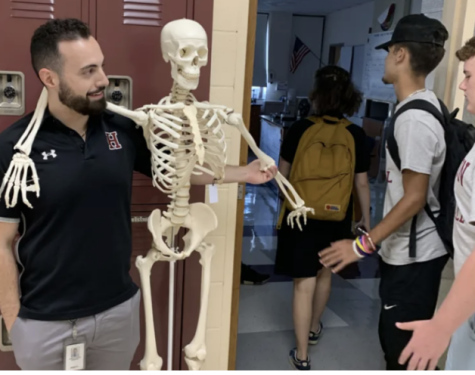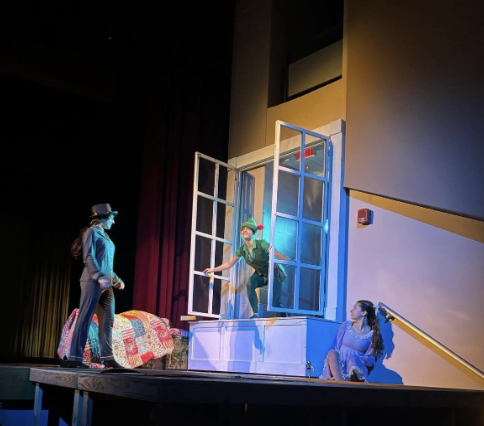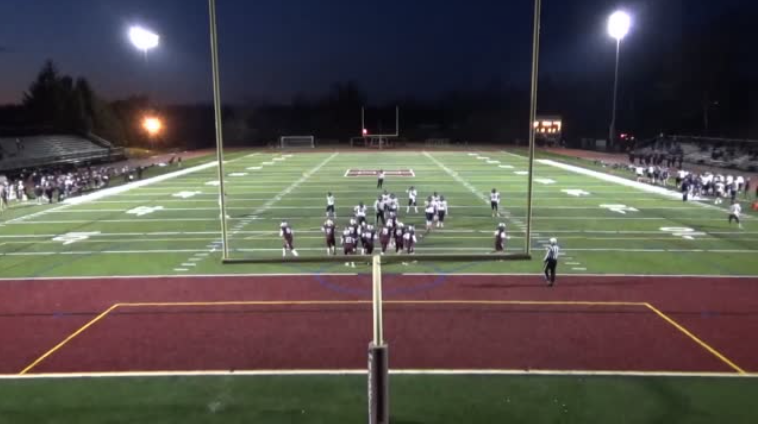Is a Longer School Day Beneficial?
February 13, 2023
At Harrison, the school day is from 7:40 in the morning to 2:30 in the afternoon; a total of six hours and fifty minutes. The average time spent in a classroom in the U.S is six hours and thirty-nine minutes. Considering that the U.S is behind in test scores compared to other countries. Despite this may seem like a closed end question, should an American school day be longer or shorter?
There are many pros and cons to having a longer school day, but is it necessary for academic success? This topic can be considered in many different ways, but in this article, it is spoken about from the student, teacher, and administration point of view.
Student Perspective
Siobhan Rice, a sophomore at Harrison High School had an opinion on the subject.
How do you think a longer school day would affect students?
“I think it would give them less time to be able to do work at home.” She said, “With the normal school time, we only get a small amount of free time or time to ourselves so with a longer school day, it would just give us no time.
In addition, students with extracurriculars and sports would be spending the entire time on school. Students’ lives would just basically be completely revolved around school and not anything they might like to do outside of school. And, this would just also be less sleep and more stress.”
An obvious pro is there would be more instructional time for students and teachers. This time could be spent in core classes where students need more assistance. This extra time in classes could help students increase their grades, and overall increase the school’s average test scores.
On the other hand, the longer school hours could result in attention deficiency and this would make the school day ineffective. According to the Centers for Disease Control and Prevention, about 13% of students aged 12-17 years old were diagnosed with ADHD. In addition, some students as young as 8th graders suffer from post-lunch attention deficit syndrome where after lunch, the attention rate in classes decreases.
According to data compiled in 2009 from Seattle Pi Education, children and teenagers in the United States spend more hours in school than kids in Asian countries, according to data compiled in 2009. Additionally, U.S children spent an average of 1,146 instructional hours per year in school, while students in Taiwan, Hong Kong, Japan and Singapore spent 1,50, 1,013, 1,005, and 903 hours respectively according to FoxNews. Nevertheless, the average test scores are lower in the U.S than countries mentioned above.
This begs the question, is a longer school day even a beneficial idea?
Teacher Perspective
Ms Palefsky, the digital art and design teacher, was asked about her thoughts on the subject.
How do you think a longer school day would affect staff, faculty and students?
“I think that since the pandemic many systems and structures have changed and just as the work world and the office world adapted to a hybrid model of working remotely and in the office,” she stated. “I feel it’s worth looking at changing the school day and accommodating to how we have found new ways to do more in less time as we have done before. I think if we could re-invent the system although that would be a big task, having shorter classes and some could be longer. Like in the arts, having a block schedule would be great. But maybe also having more breaks or a shorter day would make the time together; taking advantage of the in-person time.”
“More importantly as mental health continues to be an issue in our culture, we would have more time to address mental health concerns.A shorter school day would allow students to have more time to either decompress and sleep and develop their own lives. I think school monopolizes too much of a student’s time when it can be spent it more social settings or some students could learn best on their own in certain classes It would be a sweeping change of the system but it’s worth looking at, just how the work world is adapting as to not commuting to the office 5 days a week; it might be worth looking at if we could change the school day or number of days we ask the students to be in person.”
Do you think if we had a longer school day this would affect students both in school and out of school?
“A longer school day I think would reduce their sleep time, and I’m highly concerned about students’ sleep needs. I really think this is a concern and I think that if we try to have students be well rounded with visuals [both on the world and in school] with interests outside of academics and do other enrichment classes they wouldn’t have as much time for these other experiences like sports and extracurricular activities. I do believe that sometimes participating in extracurriculars, clubs, sports, volunteering and all these other things outside of being in a structured class makes life interesting. I think it would chip away at the areas in which you feel fulfilled and where your strengths lay. I don’t think a longer school day would be good at all.”
 For longer school days, the district/school would need to require extra funding for salaries for staff working in the school; considering, teachers, custodians, secretaries, etc.
For longer school days, the district/school would need to require extra funding for salaries for staff working in the school; considering, teachers, custodians, secretaries, etc.
While people would think that spending more time in school would increase test scores, there is no correlation between the two topics. There are several attributes that go into whether students get higher grades, such as the quality of the instruction, the time spent studying and classroom environment.
On the other hand, a longer school day could additionally help parents too. Older siblings can look after their younger siblings after they get home from school. Moreover, parents do not need to spend money on babysitters or daycare for after school.
However, a longer school day does not leave any time for personal time for students or staff. Most students have their school day, then a club or after school activity, some having both. With longer activities after school than time spent doing homework and studying; students will have rarely any time for themselves. Additionally, they will have less time to study and more importantly less time to sleep which could branch off into sleep deprivation and other serious problems.
How does this affect the administration?
Ms Beukema, the Harrison High School principal, had a few words on the subject when asked.
How would a longer school day affect the administration and staff at Harrison High School?
“It would have huge financial implications.” She stated, “A lot of teachers have young children and families so they have to pay additional costs in child care. Also, they would have to work if their child is school aged when their school day ends if they do not attend Harrison, so how are they going to be home to meet them off the buses? There would be a cost implication because you would have to compensate teachers for that additional time because their current negotiated contract is based on a certain number of hours in addition to professional development hours and all of those other kinds of things. When we look at when once a month our teachers do 2 hours outside of school professional development or if they have a one hour faculty meeting and school isn’t getting out let’s just say till 3:00, all of those other things get pushed so there contract would have to get renegotiated and I’m sure they would want to be compensated for the additional time because they would end up have to pay that on the other end for costs they have to incur as a result.”
How would a longer school day affect other staff around the school like secretaries and custodians?
“I think it would depend on their role,” Ms Beukema continued. “Our current custodian staff are here until 11 at night because we have so many night events and things like that. I would wonder since there is a half an hour gap between when the school day ends and when student athletes have to go to their practice deliberately for things like extra help if the custodians could still get things done by 11’o’clock. I guess they could still run on their regular schedule and most of our secretaries are here until 3 or 3:30 so I don’t think the support staff would be as effective as the faculty would be.”
Finally, How do you think a longer school day will affect students?
“I think students at Harrison are very scheduled. If the school day went later, there would be less time for homework and less time for the extracurricular activities students engage in outside of class. The only way I think a longer school day would work is if there would be a time where homework was built into the school day so students aren’t working on assignments outside of school which would really help students who don’t necessarily have an environment at home that’s conducive. Other than that I think 6 hours in a school day is an effective use of time.”
Longer school days seem in fact, impractical. A student’s personal life is just as important as their academic life and having time for both is an aspect the time spent in school needs to be respected.
Photo from HHS Website.



![The Fairies: [from left to right] KC Onwuasoanya, Talia Russo, Neeve Kenny, Charlotte Reville, Alexis Manalis, Abrey LaPeter, Francis Arthur, and Rosella Paniccia](https://thehuskyherald.org/wp-content/uploads/2023/11/Play-1.jpg)
























